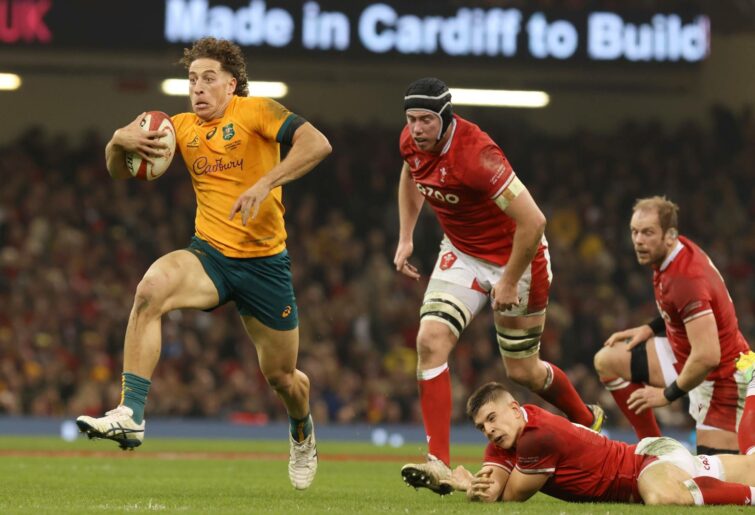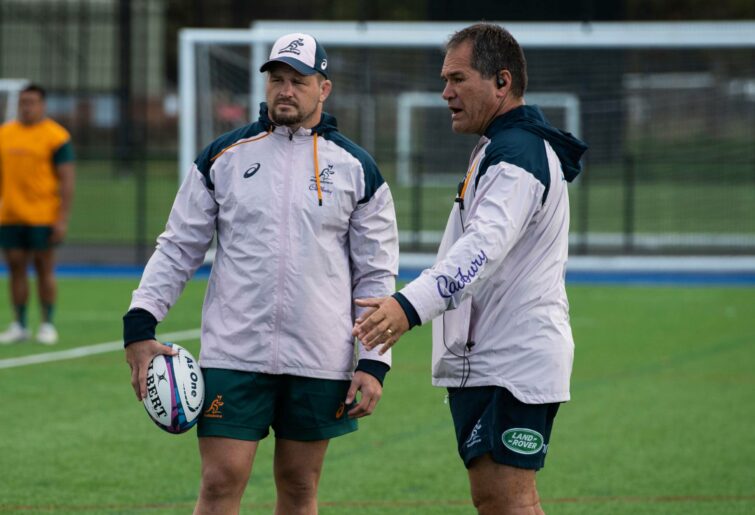It is now compulsory for every World Cup, in every sport that has one, to have a “group of death”; the pool where progress to the quarter-finals instantly appears problematic. The group nobody wants to be in.
For next year’s Rugby World Cup in France, Group C can now officially be dubbed the “group of life”, the pool everybody wants to be in.
Australia and Wales, Group C’s supposed heavyweights, respectively dealt themselves in and out of Saturday’s Test match, before Australia triumphed 39-34. Both sides did little to satisfy fans that forward progress has been made in 2022.
Indeed, ‘pool of life’ coaches Vern Cotter (Fiji) and Levan Maisasvili (Georgia) – already successful this autumn against Wales – must have been heartened by what they saw play out at Principality Stadium.
With the proviso that both sides were missing key starters, this match – high on excitement in the finish, but low on quality throughout – will not have caused either gentleman to miss any sleep. Perhaps even the coach of Portugal, Patrice Lagisquet, fresh off his side’s dramatic qualification for Group C, now also has a spring in his step?
Before we get too critical, let’s deal with the obvious. Turning a 21-point deficit into a five-point win, away from home, with a patched-up team, is no mean effort.

CARDIFF, WALES – NOVEMBER 26: Mark Nawaqanitawase of Australia runs with the ball during the Autumn International match between Wales and Australia at Principality Stadium on November 26, 2022 in Cardiff, Wales. (Photo by Huw Fairclough/Getty Images)
For all the Wallabies’ deficiencies, Dave Rennie’s team has retained its self-belief throughout, and there is no shortage of spirit and ticker right across the group. These are qualities that can help paper over cracks and carry teams further than their ability and lack of cohesion might otherwise allow.
There was some skill on display too; most of it from the again excellent Mark Nawaqanitawase, plus influential contributions off the bench from Pete Samu, Ned Hanigan and Lachlan Lonergan.
It was Lonergan who found himself on the end of a chain move in the 76th minute, who recovered a pass knocked down by replacement halfback Kieran Hardy, and who scooted around towards the post to touch down; a few seconds of glorious imperfection which rather summed up the whole match.
And it was Lonergan again – after he and fullback Tom Wright inadvertently invited Wales in for a last crack – who ferreted the ball out of a ruck and deposited it into row 15, to put an end to a Wallabies’ season that exhausted players and exasperated fans will be happy to step back from, at least for a couple of months.
It was a result that, a few minutes earlier, had hardly seemed possible, so in control was the home side, and so ineffectual were the Wallabies at managing Wales’ scrum feed, and their line-out maul drive.
Three big plays ultimately tipped things Australia’s away, the first coming moments before half-time, after Jake Gordon was yellow-carded for being offside in a potential try-scoring position.
With the Wallabies only a slipped bind from having a front-rower join him, leaving 13 defenders against 15, Wales played for the line, and by the skin of the Wallabies’ teeth, were held up.
Given Wales’ dominance of possession and field position, a 20-13 half-time deficit was an excellent outcome for the Wallabies.
Gordon will no doubt come under fire for his repeated ill-discipline, although it’s fair to say that this particular instance was neither a cynical or lazy act; more a last-ditch desperation play under intense pressure. A play justified in the end by no try being conceded when it might otherwise have been, had Gordon taken extra care about where his feet were positioned.
The promised scrum yellow card eventually came after half-time, although for the recipient Tom Robertson, it was more a case of him being the unlucky person left without a chair when the music stopped playing.
Given their choppy season, it was no surprise to see the Wallabies reduced to 13 men, but these were not the same perplexing and needless fouls that have marked their recent play.
The second major turning point was the injury to Wales pivot Gareth Anscombe, in the 54th minute, after which the home side seemed to lack the shape and direction that had served them well up until that point.
The third ‘big moment’ came in the 66th minute, with Pete Samu intercepting and bursting into the open, turning defence into attack, before going to ground in midfield.

Pete Samu of the Wallabies looks on during The Rugby Championship match between the Australia Wallabies and South Africa Springboks at Allianz Stadium on September 03, 2022 in Sydney, Australia. (Photo by Mark Metcalfe/Getty Images)
Smart work from TMO Tom Foley detected that Samu was felled by a small but sly, leg trip from Welsh captain Justin Tipuric; a yellow card offence at a key juncture of the match.
With participants and fans worldwide consistently perplexed and frustrated by the intervention of match officials, often for matters not warranting such a heavy hand, here was an example of perfect application of the TMO and card process.
Nobody, including referee Matthew Carley, saw the leg trip in real time. But it was there, it warranted highlighting, and a ‘sit down’ for the perpetrator. Foley was fully justified in involving himself.
It also did the thing cards are supposed to do; provide points scoring opportunities for the non-offending side. Tipuric’s act may have been instinctive rather than maliciously intended, but faced again with the choice of offering Samu an extra 20 metres on his run, or staying on the field for 10 minutes at the end of a Test match, to help stop his side being overrun?
No prizes for guessing that answer. And what about the irony of rugby’s most ill-disciplined team, and most injury-prone team, being helped back into the match by the injury and discipline woes of their opponent?
The Wallabies certainly had their own issues, with much of the 21-point margin down to their inability to stop Wales’ offloading and slow down their phase ball, as well as provide a counter to the line-out maul drive.
Throw in two awful second-half kicks by Len Ikitau – one off front-foot ball after Samu’s break – and some horribly lateral backline play, and it’s fair to say that the Wallabies needed every bit of help they got from the hosts.
It’s also fair to say however, that presented with an opportunity to get back into the match, and then to win it, the Wallabies were good enough to take it with both hands.
That’s the sign of a team that, even if it doesn’t quite know where it is headed, nor has all of the necessary building blocks in place, is at least pointed in the right direction.
It is doubtful that any Wallabies team has had its depth tested in the way that this team has, throughout this year. And the kindest thing that can be said about this five-match end-of-year tour schedule, was that it was unsympathetic.
There have been ructions – not unrelated – in the coaching and strength and conditioning support teams, and there is not yet a sense that Dave Rennie and his fellow selectors are as close as they need to be on settling upon their top 23.
Through it all, Rennie has proved the master of presenting a calm front-face; mostly acknowledging failings without resorting to excuses or throwing any of his players under a bus, simultaneously pumping up the tyres of replacements, making them feel like they were really his first choice all along.

James Slipper and Coach Dave Rennie during an Australia training session at the Peffermill Playing Fields, on October 28, 2022, in Edinburgh, Scotland.
That’s an admirable trait in any coach. One that should hold him in good stead when some of the big guns start to re-emerge from the casualty ward next season. Something that will be needed, if the Wallabies are to emerge out of Group C, the ‘group of life’.
Saturday night’s other action saw the Springboks deal comfortably with England 27-13, at Twickenham; a match not unlike New Zealand versus England a week before, minus the All Blacks’ late nine-minute fade-out.
It was also a match not unlike the 2019 World Cup final, the victory built on an unimpeachable set-piece, forward domination, and lightning-quick strike by South Africa, when presented with an opportunity.
Autumn has been a slow burn for the Boks, but they finish 2022 in a good place, with Faf de Klerk stepping forward to kick points on offer, the pack reasserting its dominant voice, and the team diet stabilised.
England meanwhile – with just five wins in 2022 from 12 matches – end the year in the not unfamiliar position of Eddie Jones getting in ahead of his detractors, to assure fans that he remains the right person to lead their World Cup effort.
It’s one thing to talk a big game, and another altogether to deliver it. Jones badly needs more steel in his front five, young half-back Jack van Poortfliet has learned some harsh lessons about Test rugby, and Jones is yet to demonstrate how Marcus Smith and Owen Farrell belong in the same run-on side.
Spare a thought for Smith though, wandering around on the pitch well after lights-out, still trying to figure out where Kurt-Lee Arendse had got to.
England’s loss however, pales into insignificance with the passing of Doddie Weir, at age 52, after suffering from Motor Neurone Disease.
Much loved, on and off the field, Weir played 62 Tests for Scotland and, in recent years, garnered enormous respect and support worldwide, for the public way in which he took on his disease, in the process raising millions of pounds through his My Name 5 Doddie Foundation.
Rugby is poorer for Weir’s passing but richer for his involvement in the game.































































































